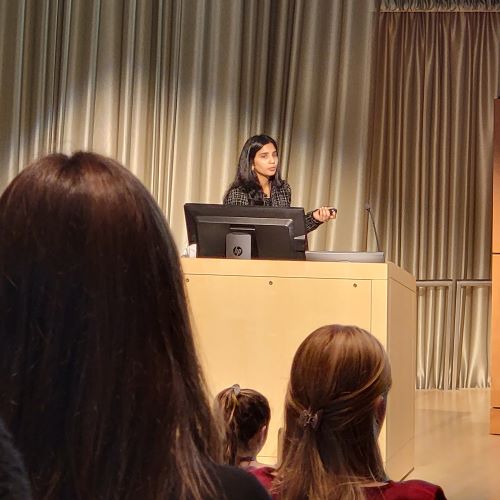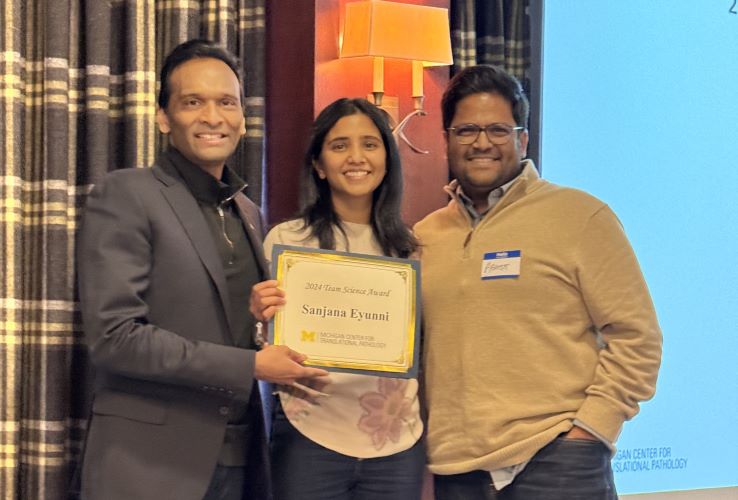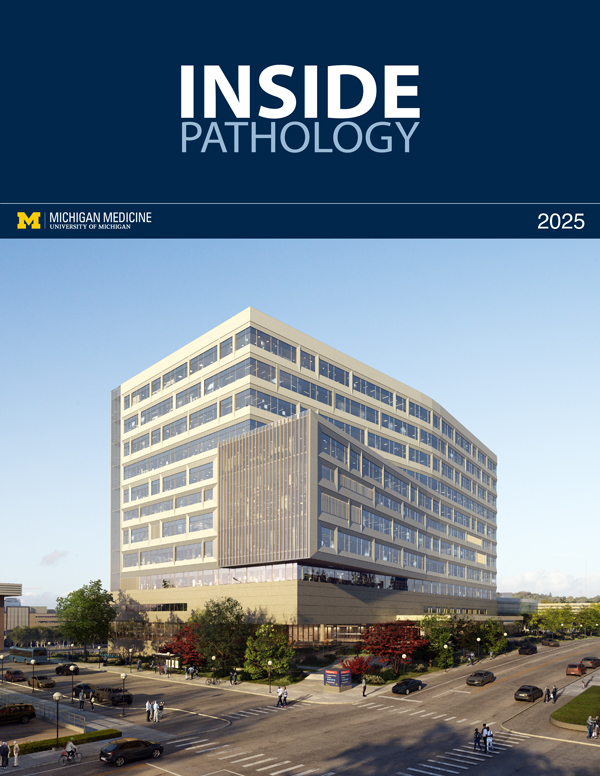Sanjana Eyunni Becomes Dr. Sanjana Eyunni
By Lynn McCain | August 11 2025For decades, cancer has been primarily viewed as a disease caused by genetic mutations, but Molecular and Cellular Pathology (MCP) graduate student Sanjana Eyunnis' research is expanding this perspective. Through her dissertation work, she focused on uncovering the interplay between the genome (your genetic information) and the epigenome, which is a collection of chemical compounds that modify our DNA and associated proteins, called histones, in our cells. These epigenomes modify how genes are expressed without altering the DNA itself.
 In her research, Eyunni examined the interplay of two key proteins, FOXA1 and NSD2, in the reprogramming of the androgen receptor (AR), a salient feature of prostate cancer. “In my research, I detailed the functional and phenotypic impacts of FOXA1 mutations in prostate cancer and identified NSD2 as a cancer-specific epigenetic regulator that collaborates with FOXA1 to drive AR-dependent oncogenesis.”
In her research, Eyunni examined the interplay of two key proteins, FOXA1 and NSD2, in the reprogramming of the androgen receptor (AR), a salient feature of prostate cancer. “In my research, I detailed the functional and phenotypic impacts of FOXA1 mutations in prostate cancer and identified NSD2 as a cancer-specific epigenetic regulator that collaborates with FOXA1 to drive AR-dependent oncogenesis.”
Her thesis research, published in her dissertation, Chimeric AR Motifs and Neo-Enhancer Expansion in Prostate Cancer Development, presents the first evidence of FOXA1-driven prostate adenocarcinoma formation in mouse models and further substantiates the structural classification of distinct FOXA1 alterations within its coding region or genomic locus. Furthermore, she characterized collaborative reprogramming of the prostate cancer epigenome by the NSD1 and NSD2 enzymes, which descended from the same ancestral gene. This suggests that co-targeting these paralogous enzymes is a promising therapeutic strategy for advanced, lethal forms of the disease.
Eyunni was born in India, where she completed her undergraduate and master’s degrees at Vellore Institute of Technology, obtaining her master’s in biotechnology. She credits her interest in science to a high school biology teacher. “Kapana Puri had such an impact, not just on me, but on a lot of students who eventually decided to pursue medicine. She was an amazing biology teacher. I naturally gravitated to her courses and her lessons in biology.”
During her master’s program, she came to the University of Michigan to work in Dr. Arul Chinnaiyan’s laboratory as part of a six-month study-abroad program. This is where she was first exposed to conducting research. “I really enjoyed being here. I loved the research that was going on. It was very translational, yet fundamental,” commented Eyunni.
After completing her master’s degree, she applied to the University of Michigan through the Program in Biomedical Sciences (PIBS), then selected the Molecular and Cellular Pathology graduate program to continue her work with Dr. Arul Chinnaiyan and Dr. Abhijit Parolia as co-mentors. “I am deeply grateful to Arul and Abhijit for their exceptional mentorship — their guidance and support have been instrumental to my success throughout my PhD journey.”
“The MCP program strikes a wonderful balance between fundamental biology and translational research,” Dr. Eyunni says, praising the collaborative, close-knit community. “The training environment has been outstanding, with access to clinical expertise, a range of faculty specialists, and a cohort of talented students”.
 Eyunni’s research on the role of FOXA1 stands to impact a large number of men with prostate cancer, particularly among Caucasian and Asian populations. “FOXA1 is mutated in over 41% of Asian men when they present with primary prostate cancer.” Eyunni generated mouse models to study the process and conducted many different characterization studies using histologic, sequencing-based, and multi-omic methods. She demonstrated that distinct FOXA1 mutations have divergent functional phenotypes in prostate cancer: “Class 1 mutations drive tumor progression, while Class 2 mutations drive therapy resistance, directly implicating these mutations in carcinogenesis.” She also identified a new cancer-specific co-factor of AR called NSD2 that collaborates with FOXA1 to drive prostate tumorigenesis. The mouse models generated as a part of her thesis work can facilitate research into breast, salivary gland, and bladder cancers, where FOXA1 is a driver oncogene. “This is a bioresource for the field of FOXA1-driven cancers”, says Eyunni.
Eyunni’s research on the role of FOXA1 stands to impact a large number of men with prostate cancer, particularly among Caucasian and Asian populations. “FOXA1 is mutated in over 41% of Asian men when they present with primary prostate cancer.” Eyunni generated mouse models to study the process and conducted many different characterization studies using histologic, sequencing-based, and multi-omic methods. She demonstrated that distinct FOXA1 mutations have divergent functional phenotypes in prostate cancer: “Class 1 mutations drive tumor progression, while Class 2 mutations drive therapy resistance, directly implicating these mutations in carcinogenesis.” She also identified a new cancer-specific co-factor of AR called NSD2 that collaborates with FOXA1 to drive prostate tumorigenesis. The mouse models generated as a part of her thesis work can facilitate research into breast, salivary gland, and bladder cancers, where FOXA1 is a driver oncogene. “This is a bioresource for the field of FOXA1-driven cancers”, says Eyunni.
Dr. Eyunni also acknowledges the outstanding teams in both labs, many of whom she has worked closely with to develop her skills. “Science today is truly a team effort, and I am grateful to the many members who have generously shared their knowledge with me throughout this journey.” She loves being at the bench, conducting experiments, and drawing insights from multiple disciplines to deepen her understanding of her research. During her PhD, Eyunni has also found great joy in mentoring numerous students in the lab, cherishing those moments as some of the most rewarding in her academic career.

Outside the lab, Eyunni loves to read, cook, work out, and read non-fiction books. “I particularly enjoy autobiographies, biographies, and the world of human evolution in general. I also love being outside and enjoy running.”
Congratulations Dr. Sanjana Eyunni for completing your PhD. We hope you have a successful launch to your career as you pursue your postdoctoral research.
 ON THE COVER
ON THE COVER
 ON THE COVER
ON THE COVER
 ON THE COVER
ON THE COVER
 ON THE COVER
ON THE COVER
 ON THE COVER
ON THE COVER
 ON THE COVER
ON THE COVER
 ON THE COVER
ON THE COVER
 ON THE COVER
ON THE COVER
 ON THE COVER
ON THE COVER
 ON THE COVER
ON THE COVER
 ON THE COVER
ON THE COVER
